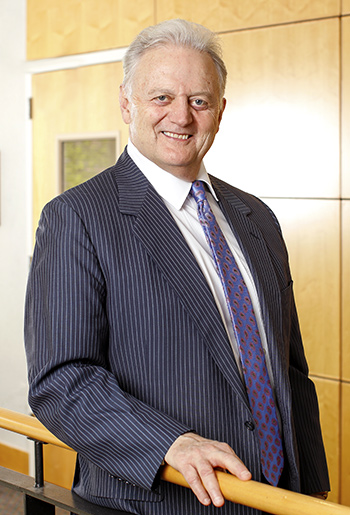Helping clients achieve financial freedom
Helping clients achieve financial freedom

Jerry Wells • Rochester, NY
Financial Freedom Group • SagePoint Financial, Inc.
Read full biography below
Proactive Advisor Magazine: Jerry, describe your overall philosophy in working with clients.
I have been working in the financial-services industry for about 40 years. As the industry has evolved, one thing remains constant: the importance of truly understanding a client’s needs and developing a strong, trusting relationship on a personal level. I think I have been blessed with being a people person and having strong communication skills. I studied education and teaching in college, and many of the disciplines I learned then have been beneficial in my practice.
We tell clients that, as they start working with our firm, they will notice a difference from other experiences they might have had with the financial industry. We pride ourselves on the personalized, hands-on approach we take with our clients. We want to know as much about them, their family, and their finances as we possibly can. That allows us to determine realistic and achievable goals and helps build a solid foundation for long-term relationships. In addition to scrutinizing financial statements and portfolios, we ask many qualitative questions about a client’s feelings toward money, investing, and their aspirational dreams. This information is just as important as the data contained in financial statements.
The name of our firm, the Financial Freedom Group, was chosen with a purpose in mind. We talk about achieving financial freedom in many ways with clients. That does not mean that clients must reach for outsized investment returns or drastically change their lifestyle. It simply means that putting a sound plan and effective strategies in place can help our clients remove uncertainty and worry about their financial future. There are no guarantees in life or in investments, but taking those important steps, we believe, can significantly improve the probabilities for long-term financial success.
Explain your planning process in a little more detail.
 I have delivered many traditional, lengthy financial plans to clients over the course of my career, but, to be honest, a lot of those seem to end up collecting dust somewhere in a client’s home. We have found that a far more interactive way of working with clients is both educational and collaborative. This includes all of the process-oriented steps you would expect: gathering data, setting goals, designing a plan, developing recommendations, and scheduling the implementation. But we like to supplement this traditional approach with a proprietary planning model our firm has developed.
I have delivered many traditional, lengthy financial plans to clients over the course of my career, but, to be honest, a lot of those seem to end up collecting dust somewhere in a client’s home. We have found that a far more interactive way of working with clients is both educational and collaborative. This includes all of the process-oriented steps you would expect: gathering data, setting goals, designing a plan, developing recommendations, and scheduling the implementation. But we like to supplement this traditional approach with a proprietary planning model our firm has developed.
Once we have had initial meetings with a client or client couple and have a better understanding of their financial situation, we will schedule a work session in our conference room. We use a large whiteboard that we like to call the “Financial Freedom board.” We personalize it with a photo of the client or the couple. We lay out the critical factors of their financial situation—for example, current assets, future income sources, liabilities, and the tax status of their various assets. We construct timelines identifying important decision points such as Social Security claiming or when mandatory distributions will take place. By extrapolating out to the future using various assumptions about rates of return and expenses in retirement, we can identify potential gaps or surpluses.
This is certainly not the final product we deliver to a client, but it helps clients visualize their financial plan and allows them to take an active role in identifying trade-offs and potential solutions. Following this session, our team gives a more formal presentation of detailed recommendations and rationale. We believe this process helps clients develop a greater sense of ownership of their plan.
This is also an excellent venue for imparting some key financial education concepts and discussing any special life circumstances the client may have. Do they need to plan for college expenses, any special-needs family members, or elder care? Do they have specific goals related to what they want their lifestyle to look like in retirement? What are their thoughts on legacy planning? Are there charities involved they feel are important in their legacy planning? Do they have business-related planning needs? We cover all of the bases in the work session, and it is an effective forum for getting relevant issues out on the table.
What are some of the most important financial or investment concepts you frequently discuss with clients?
 We will talk a great deal about the sequence of returns for clients about to enter retirement or already in retirement. Our key focus as a firm is to help clients build a comprehensive plan to generate a retirement income stream that they can depend on for the rest of their lives. When clients hit their 50s or 60s, they really cannot afford to have a portfolio drawdown of 30% or 40%. Most people do not realize how much incremental return is required to make up for a large loss, so that is one of the concepts we will review. If those severe drawdowns occur as a client is about to begin a distribution plan from their assets, the math just does not work out over the long haul.
We will talk a great deal about the sequence of returns for clients about to enter retirement or already in retirement. Our key focus as a firm is to help clients build a comprehensive plan to generate a retirement income stream that they can depend on for the rest of their lives. When clients hit their 50s or 60s, they really cannot afford to have a portfolio drawdown of 30% or 40%. Most people do not realize how much incremental return is required to make up for a large loss, so that is one of the concepts we will review. If those severe drawdowns occur as a client is about to begin a distribution plan from their assets, the math just does not work out over the long haul.
We also talk quite a bit about our belief in money management using professional third-party firms that emphasize risk management in their strategies. Active, risk-managed strategies are designed to smooth out an investor’s ride in the market by harnessing volatility to some degree and avoiding market extremes. This approach helps clients better control their emotions and stick with an investment plan over the long term, which is especially important for those in or approaching retirement.
Passive index investing might seem great for bull market periods like the past eight years, but people tend to have short memories. It is our job to reinforce the realities of market cycles and the historical fact that the market will face rocky periods again. I have lived through plenty of bull markets and bear markets. As an advisor, you learn more in the bear markets than you do the bull markets. For most of our clients, I need to be more concerned at their age about the return of money than the return on money.
“We want to create portfolios for clients that appropriately align with their risk-management, growth, and income needs.”
But I think our clients can benefit from competitive returns in bull markets while using strategies that attempt to protect their assets during bear markets. Controlling the downside volatility of any portfolio can be more important than how much is made on the upside. We look to build a strategic, well-diversified portfolio that considers a client’s risk profile, objectives, time horizon, total assets, liabilities, and potential income streams.
We want to create portfolios for clients that appropriately align with their risk-management, growth, and income needs. We have a variety of excellent tools that we can use. Our approach might be a blended one, including annuities, fixed income, passive strategies, and active strategies. Having this type of discussion, I think, is a good approach that works well with our clients’ true outlook on risk and their concern for their financial future. Active investment management, with its emphasis on risk management, has become a big part of what our firm does on the investment side.
After you have worked with a client for several years, how would you ideally like them to describe you and your firm to their friends or family?
With all due modesty, I would like them to feel they have had a very positive experience with our firm that has profoundly impacted how they view their financial future. I hope they will have achieved a sense of confidence and security as they look forward to the rest of their lives. I think a big part of that is our willingness and desire to deal with each client or family in a highly personal fashion that can go well beyond being a retirement planner or financial advisor.

I am happy to help people with issues such as household budgeting, managing their debt, buying real estate or a car, or planning for the care of an elderly relative. I want people to think of us as being there in any way they might need us. If we do not have the expertise in our firm for a specific issue, as their financial quarterback, we will help them find the appropriate resource.
I would also like clients to feel they fully understand their financial goals, objectives, and strategies and have acquired a good deal of education and ownership in the development of those. The bottom line is, I would like them to have a heightened sense of the financial freedom that our firm so often talks about.
 Jerry Wells is a financial advisor and principal at the Financial Freedom Group, located in Rochester, New York. Mr. Wells says his independent firm “provides financial guidance to clients through strategies that aim to build their assets and then convert those assets into a retirement income stream they don’t outlive.”
Jerry Wells is a financial advisor and principal at the Financial Freedom Group, located in Rochester, New York. Mr. Wells says his independent firm “provides financial guidance to clients through strategies that aim to build their assets and then convert those assets into a retirement income stream they don’t outlive.”
A native of the Rochester area, Mr. Wells grew up in a large family, where he was “the middle child out of seven, six boys and one girl.” He graduated from Ithaca College, where he played football for four years and was a starting offensive tackle on a team that went to the Division III national finals.
Following college, Mr. Wells embarked on a career in the insurance industry with Prudential. Over the next three decades, he reinvented his skill set and career path several times as the financial industry went through what he calls “a series of evolutionary steps.” After 26 years within the MetLife family of companies and positions of increasing responsibility, Mr. Wells became an independent financial advisor in 2016.
Mr. Wells and his wife reside in the Rochester area and have one adult daughter. They enjoy spending time at their vacation home at Keuka Lake and taking trips that are on their “bucket list.” Mr. Wells is a board member of the Rochester Contemporary Art Center.
Disclosure: Jerry Wells is an investment advisor representative offering securities and advisory services through SagePoint Financial, Inc., member FINRA, SIPC, and a registered investment advisor. Financial Freedom Group is independent of SagePoint Financial, Inc. 132 Allens Creek Rd., Rochester, NY 14618. 585.244.9444.
Photography by Matt Wittmeyer

